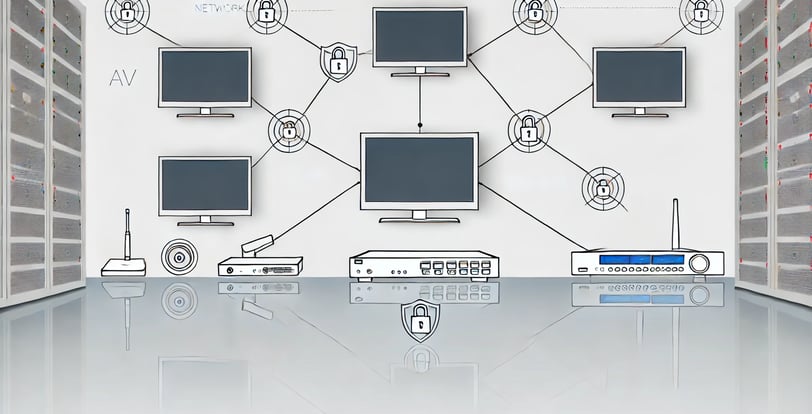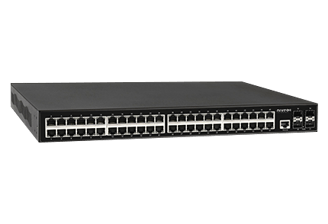"Enhancing Network Security in AV Installations"
#AVCentricNetworking #Avixa, #Cedia, #AVNU, #SDVoE #AVoIP #AVoverIP #proav #AVTweeps
Arthur de Jager - Niveo Professional
9/12/20245 min read


Enhancing Network Security in AV Installations
Introduction
In today’s interconnected world, audio-visual (AV) installations are becoming increasingly sophisticated and integral to various sectors, including corporate environments, educational institutions, entertainment venues, and smart homes. However, as these systems become more advanced and interconnected, they also become more vulnerable to security threats. Enhancing network security in AV installations is crucial to protect sensitive information, ensure the integrity of AV systems, and maintain the overall performance and reliability of the network. This blog explores the best practices for enhancing network security in AV installations and highlights how Niveo Professional contributes to this critical aspect.
Understanding the Importance of Network Security in AV Installations
Network security is the practice of protecting data, applications, devices, and networks from cyber threats and unauthorized access. In AV installations, network security is paramount for several reasons:
Data Protection: AV systems often handle sensitive information, including corporate communications, educational content, and personal data. Protecting this data from unauthorized access and breaches is essential to maintain privacy and compliance with regulations.
System Integrity: Cyber threats can compromise the integrity of AV systems, leading to malfunctions, data loss, and operational disruptions. Ensuring the security of the network helps maintain the reliability and functionality of AV installations.
User Trust: Users of AV systems, whether in a corporate, educational, or residential setting, expect their data and communications to be secure. Enhancing network security helps build and maintain user trust and confidence in the system.
Best Practices for Enhancing Network Security in AV Installations
1. Implement Strong Authentication and Access Controls
One of the most effective ways to enhance network security is to implement strong authentication and access controls. This includes:
Multi-Factor Authentication (MFA): Requiring users to provide multiple forms of verification (e.g., password and fingerprint) before accessing the network.
Role-Based Access Control (RBAC): Assigning permissions based on user roles to ensure that individuals only have access to the resources necessary for their role.
Regularly Update Credentials: Ensuring that all passwords and access credentials are regularly updated and follow strong password policies.
2. Use Network Segmentation
Network segmentation involves dividing the network into smaller, isolated segments to limit the spread of cyber threats. This can be achieved using Virtual Local Area Networks (VLANs) and firewalls to create secure zones within the network. By segmenting the network, you can:
Contain Threats: Prevent the spread of malware and other threats to critical parts of the network.
Improve Performance: Reduce network congestion and improve performance by isolating high-traffic areas.
Enhance Management: Simplify network management and troubleshooting by creating smaller, more manageable segments.
3. Regularly Update and Patch Systems
Keeping all devices and software up to date with the latest security patches is crucial for protecting the network from vulnerabilities. This includes:
Firmware Updates: Regularly updating the firmware of all AV devices and network equipment to address security vulnerabilities and improve performance.
Software Patches: Applying security patches and updates to all software applications used in the AV installation.
Automated Updates: Implementing automated update mechanisms to ensure that all systems are consistently updated without manual intervention.
4. Monitor Network Activity
Continuous monitoring of network activity helps detect and respond to security threats in real-time. Key practices include:
Intrusion Detection Systems (IDS): Deploying IDS to monitor network traffic for suspicious activity and potential security breaches.
Log Analysis: Regularly reviewing network logs to identify unusual patterns or unauthorized access attempts.
Real-Time Alerts: Setting up real-time alerts to notify administrators of potential security incidents, allowing for prompt response and mitigation.
5. Encrypt Data Transmission
Encrypting data transmitted over the network helps protect it from interception and unauthorized access. This includes:
Secure Communication Protocols: Using secure communication protocols such as HTTPS, SSL/TLS, and VPNs to encrypt data transmission.
End-to-End Encryption: Implementing end-to-end encryption for all sensitive communications and data transfers.
Encrypted Storage: Ensuring that data stored on network devices and servers is encrypted to protect it from unauthorized access.
6. Conduct Regular Security Audits and Assessments
Regular security audits and assessments help identify and address potential vulnerabilities in the network. This involves:
Penetration Testing: Conducting penetration testing to simulate cyber-attacks and identify weaknesses in the network.
Vulnerability Assessments: Performing regular vulnerability assessments to identify and mitigate security risks.
Compliance Checks: Ensuring that the network complies with relevant security standards and regulations.
Case Studies: Real-World Applications of Network Security
1. Corporate Office Network Security
A multinational corporation implemented a comprehensive network security strategy for its AV installations across multiple offices. By using strong authentication controls, network segmentation, and continuous monitoring, the company was able to protect sensitive corporate communications and ensure the integrity of its AV systems. Regular security audits and automated updates further enhanced the security posture, allowing the company to maintain a secure and reliable network environment.
2. Educational Institution Network Security
A large university deployed advanced network security measures to protect its AV installations used for online lectures and campus-wide communications. By implementing MFA, VLANs, and encryption, the university safeguarded student data and ensured the uninterrupted operation of its AV systems. Real-time monitoring and regular vulnerability assessments enabled the IT team to quickly identify and address potential security threats, maintaining a secure learning environment.
3. Smart Building Network Security
A smart building project incorporated robust network security measures to protect its integrated AV systems and IoT devices. Using strong access controls, encrypted communication protocols, and continuous monitoring, the building management ensured the security and reliability of its AV and automation systems. Regular security assessments and automated patching helped maintain a high level of security, providing a safe and efficient environment for occupants.
The Role of Niveo Professional in Enhancing Network Security
Niveo Professional is committed to providing high-performance networking solutions that prioritize security. Niveo Professional switches and networking equipment are designed with advanced security features, including support for strong authentication protocols, VLANs for network segmentation, and robust encryption for data transmission. These features help protect AV installations from unauthorized access and cyber threats, ensuring the integrity and reliability of the network.
In addition to these built-in security features, Niveo Professional offers comprehensive network management tools that enable real-time monitoring and control of network activity. This allows administrators to quickly identify and respond to potential security incidents, enhancing the overall security posture of AV installations. By integrating Niveo Professional networking solutions, AV integrators can build secure, reliable, and high-performance networks that meet the demands of today’s sophisticated AV environments.
About Niveo Professional
Niveo Professional is a leading manufacturer of Network Equipment for pro-AV. A pioneer in the industry, that has brought many innovations to make life of the Integrator Easy!
About Arthur de Jager
Arthur de Jager is co-founder of Niveo Professional, Entrepreneur and author and active in the AV-industry for over 30 Years.






